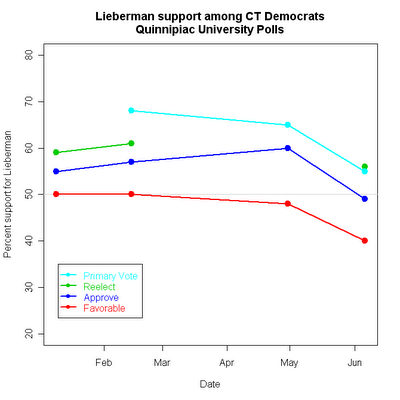
It is incredibly rare to see a Senator more popular among opposition partisans than within his own party. Yet that is increasingly the case for Connecticut Senator Joe Lieberman. Since late in 2005, Lieberman's approval rating among Democrats has dropped from around 70%, to the mid-50s. In two early June polls, Lieberman fell again, to under 50% approval among Democrats. This was after Democratic primary challenger Ned Lamont's strong showing at the CT Democratic Convention, but before Lieberman made public his plans to run as an independent should he lose the primary. (The data in the graph are taken from Quinnipiac University polls and from SurveyUSA's 50 state tracking poll in Connecticut. The two polling houses track each other reasonably well in CT, so I've pooled the data and won't focus on differences between the two polling organizations here.)
While slowly trending down recently, Lieberman's job approval among Republicans remains in the upper 60s, while job approval among independents has fallen to the mid-to-upper 50s, as has overall approval.
Much of this has to do with opposition to the war and Lieberman's support of it, and an angry and vocal group of Democratic activists and bloggers. Of the 34% of CT Democrats who say Lieberman does not deserve to be reelected, the largest group (30%) cite his support for the war as the primary reason. Most CT Democratic voters tell the Quinnipiac University pollsters that they would be casting a vote against Lieberman (78%) rather than for Lamont (19%). (Quinnipiac poll, May 31-June 6, 2006.)
But hiding in that last paragraph is the reason Lieberman may not be as badly off as the hype might suggest. Only 34% of Democrats said Lieberman should not be reelected. Of those, 30% cited the war. Thus only 10.2% of Democrats appear to be primarily reacting in opposition to Lieberman's war position. Another 13% say he is too conservative and 11% more say he's "too close to Bush". Adding that in amounts to 58% of the 34% opposed to reelection citing ideology and support for Bush or the war, a total of 19.7% of Democrats. That is undoubtedly an intense and activated 19.7%, and in the primary they may have substantial say. But it remains well shy of a majority of Democrats in Connecticut, 56% of whom still say Lieberman deserves reelection and 57% of whom say they would vote for Lieberman in the primary against Lamont. (Lieberman leads with 55% among "likely Democratic primary voters" in the Quinnipiac poll.)
Lieberman's numbers are down substantially from last winter, but Lamont must still overcome very low name recognition numbers. In the June poll, 73% of Democrats said they didn't know enough about Lamont to have a favorable or unfavorable impression of him, and those that did offer an opinion split 11%-6%, not a great start with just two months until the primary (at the time the poll was conducted.) And in a three way general election, Lamont received only 33% support from Democratic voters. Lieberman got 52% (and 56% overall, to Lamont's 18%).
Yet Lamont has risen to 40% support among likely primary voters, despite his low name recognition. Among the larger group of registered Democrats, he trails 32-57. Among self-identified liberal Democrats he narrows this to a 41-49 deficit, almost doubling his 22% support among liberal Dems in May. But even in Connecticut moderate Democrats outnumber liberal Democrats by about 2-1. Among moderate Dems, Lieberman leads 61-26, down from 67-18 in May, but still a very strong lead.
Still, Lieberman has suffered more losses in job approval and especially favorability than he has (as of early June) in vote support or reelection percentage. The figure below shows these trends through the first six months of 2006.

While Lieberman might well take heart on the "reelect" and primary vote percentages, his declining job approval and especially his favorability ratings, raise the possibility of a rapid decline in personal standing with Democratic voters. (The figure above shows results among Democratic voters only.) While vote support has been a bit slow to follow, the declines in personal evaluations may be leading indicators of further vote erosion.
As we enter the last month before the August 8th primary, Lieberman's embrace of an independent run for reelection may well have hurt his standing among Democrats more. (We should have some more polls next week to help answer that.) Even though he has done well in hypothetical three way races, talk of bolting the party after a primary defeat will likely further erode Lieberman's favorability rating, and perhaps bring more Dems to consider Lamont seriously. Perhaps Lieberman's embrace of the independent option reflects his private polling which possibly shows a situation grown much more dire since the last Quinnipiac poll of May 31-June 6. The SurveyUSA poll of job approval taken June 9-11 found approval at 46% compared to Quinnipiac's 49%. I'd be inclined to write that off to random noise or house effects, but perhaps Lieberman has suffered more in June than these two early June polls indicate.
In any case, it is ironic that Democrats are locked in a fight over the renomination of a Senator who looked like a shoo-in six months ago. It would be ironic indeed if Democrats pick up the six Republican seats they need to take back the Senate, only to have forced one of their own out of the party. An independent Joe Lieberman might possibly decide which party controls the Senate in 2007. Wouldn't that be interesting.
Click here to go to Table of Contents